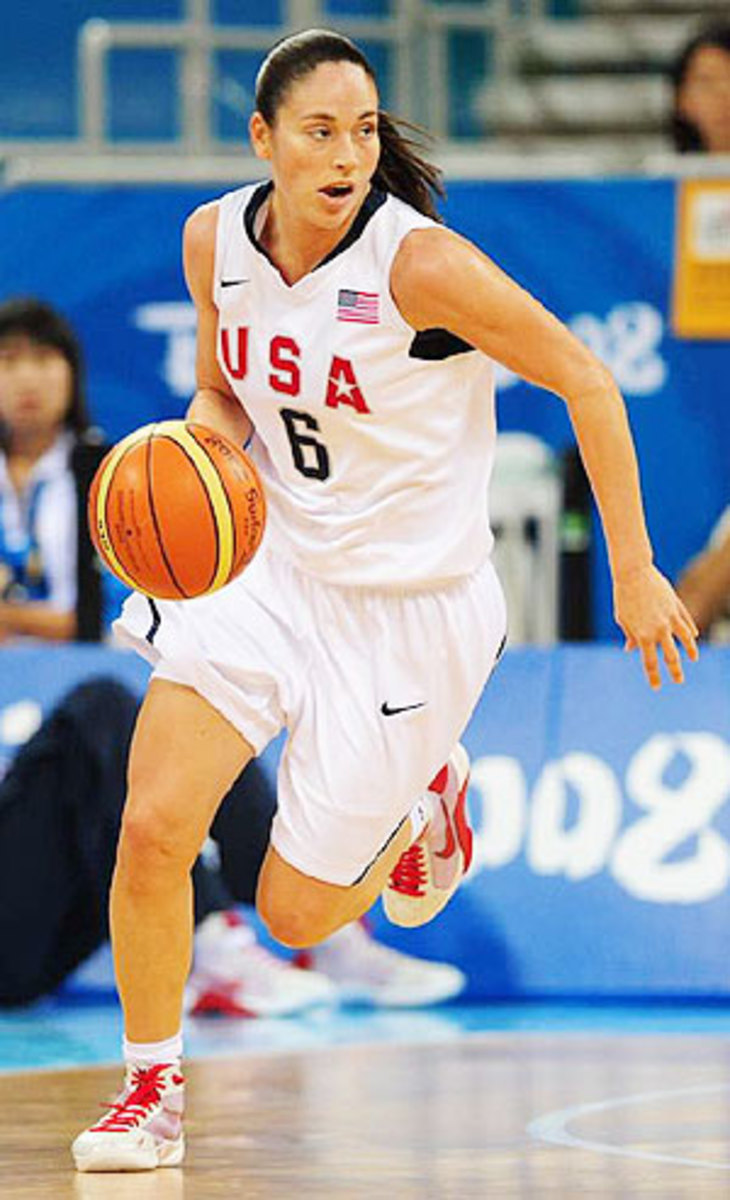U.S. team will put friendships aside in quest to win gold medal
Most days, Sue Bird is friends with Becky Hammon, the South Dakotan who created a controversy when she decided to suit up for the Russian Olympic team this summer. On Thursday, when the U.S. (6-0) takes on Russia (5-1) in the first semifinal of the women's basketball competition at the Beijing Olympic Basketball Gymnasium? Not so much. "She's playing for Russia right now, so that makes her the enemy," Bird says of Hammon.
If Hammon were not Russia's leading scorer over the past six games Bird and her teammates might not give her much thought as they prepare for this long-awaited matchup. Long before Hammon entered the picture, the U.S. had a score to settle with Russia after losing to the Russians in the semifinals of the 2006 World Championships. That ruined a long international winning streak and was "a piece of humble pie," as Diana Taurasi puts it. "We've been waiting a long time for an opportunity to play them again," she says.
No U.S. player who was on that team will forget the noise in the arena in Sao Paulo during that game or the silence in the locker room afterward. Beating the U.S., says Bird, made Russia's tournament. "It didn't matter to them that they came in second [to Australia]," she says. "We knew that, but to experience it, to hear the entire gym, including Australian players who were sitting in the stands cheering for Russia against us, that is much different from just knowing it. I think we learned a lot from that loss. We're not going to take anything for granted."
Specifically, the U.S. can't assume the 43-point victory margin, the 13-rebound margin, or the significant height advantage it has enjoyed over its first six opponents in Beijing. Russia's center, Maria Stepanova, has three inches on Lisa Leslie and Sylvia Fowles, who are both 6-foot-5, and pulls down more than six rebounds a game. But wings Svetlana Abrosimova and Ilona Korstin grab even more, averaging nearly seven apiece. The biggest worry for the U.S. might be Hammon, who moved to the starting lineup in Russia's last game and is leading the team with 13.2 points a game.
"Becky's doing a great job for them," says U.S. assistant coach Gail Goestenkors. "We've got to contain her. As she's played more with them, you can see the comfort level has gone up with what they are running. Now she knows where they are."
Unlike the U.S., Russia hasn't looked consistently good in this tournament, losing to Australia 75-55 early on. But Bird says that neither that loss nor her team's winning streak will mean anything on Thursday night. "Sometimes [winning] these games can give you a false sense of reality," she says. "The good news is we have a lot of people who have been here before and know that the first five six games might not be the toughest. I understand Russia hasn't been playing that well, they lost to Australia by a lot, but that doesn't matter. You get into the semis, I guarantee you they are going to play the best game of their lives."
That's what Australia (6-0) will be expecting from host China (5-1) in the night cap. China is coached by Aussie Tom Maher, who guided the Opals to a bronze medal in Atlanta in 1996 and a silver in 2000 in Sydney. "If you look at how Korea plays, that's your typical Asian team," says Donovan. "Pass and run, cut and run. There's not always a pattern to it. But China is very pattern-oriented. He has made it a more western-style team."
Miao Lijie, who scored 26 points in her team's 84-81 upset of the U.S. in an exhibition game this spring, has been Maher's star, averaging 19.5 points a game in the Olympics. However, 6-6 Chen Nan has been a revelation. Known as an imposing body but not much of a scoring threat, she has been China's second-leading scorer in Beijing, with 14.5 points a game. "That outside-inside punch make them a little bit more difficult to deal with, plus they are riding all the energy and enthusiasm in the gym," says Donovan.
Australia enters this game banged up. Star forward Penny Taylor, the MVP of the 2006 World Championships, rolled her ankle midway through the Opals' quarterfinals game against the Czech Republic on Tuesday and may not suit up against China. Two-time WNBA MVP Lauren Jackson, the team's other star, has been suffering from a nagging ankle injury that will require surgery immediately after the Games. But even without either of those two at full strength, Australia is deep enough, tall enough and strong enough to eliminate China.
The guess here is that Australia, with or without Taylor, will overwhelm China, and that the U.S.' depth will wear down Russia. If both things come to pass, the U.S. and Australia will play for the gold medal, on Saturday, for the third straight Olympics, and more friendships -- Bird and Jackson are WNBA teammates, as are Taylor and Taurasi -- will have to be put on hold.






